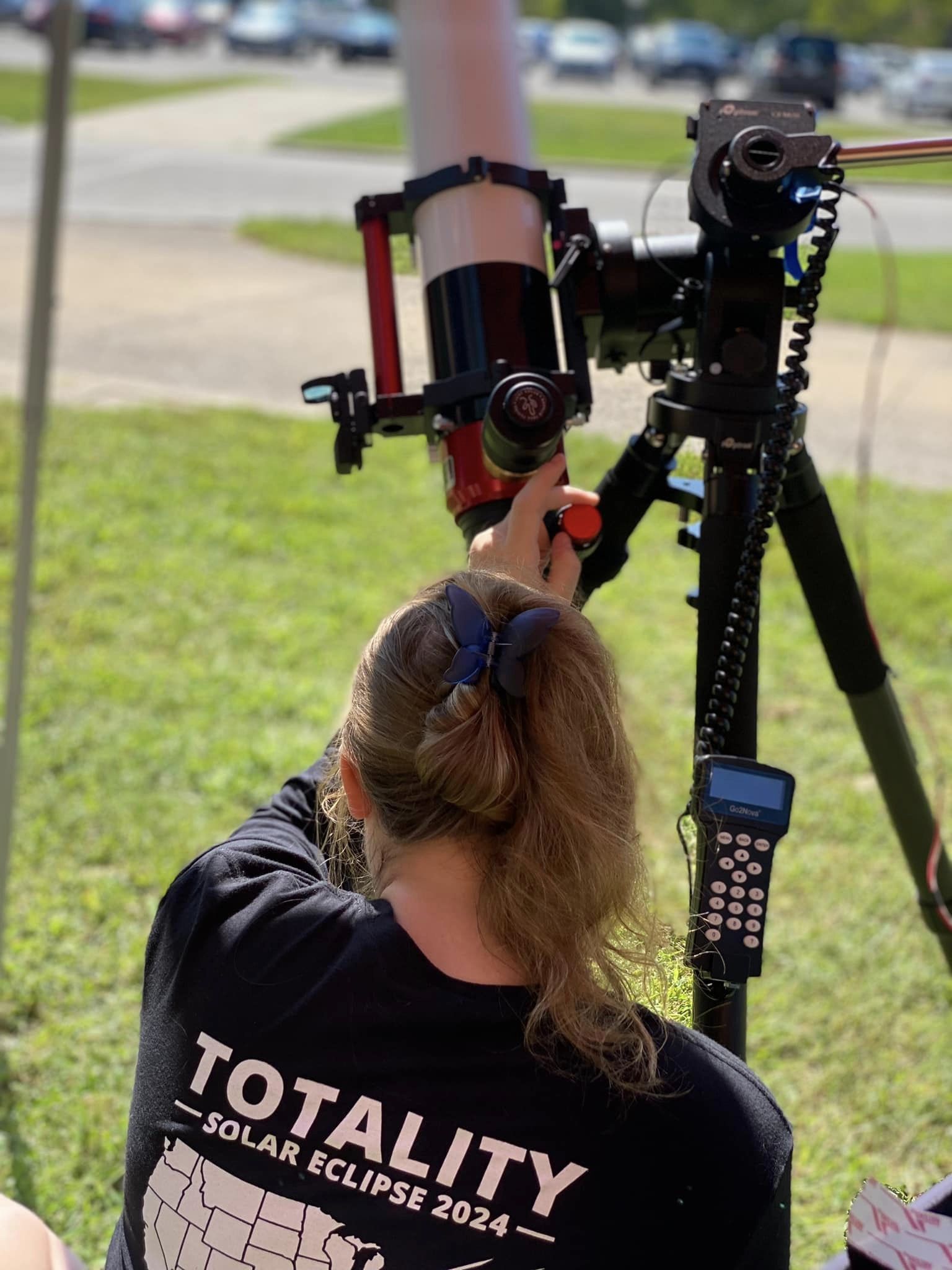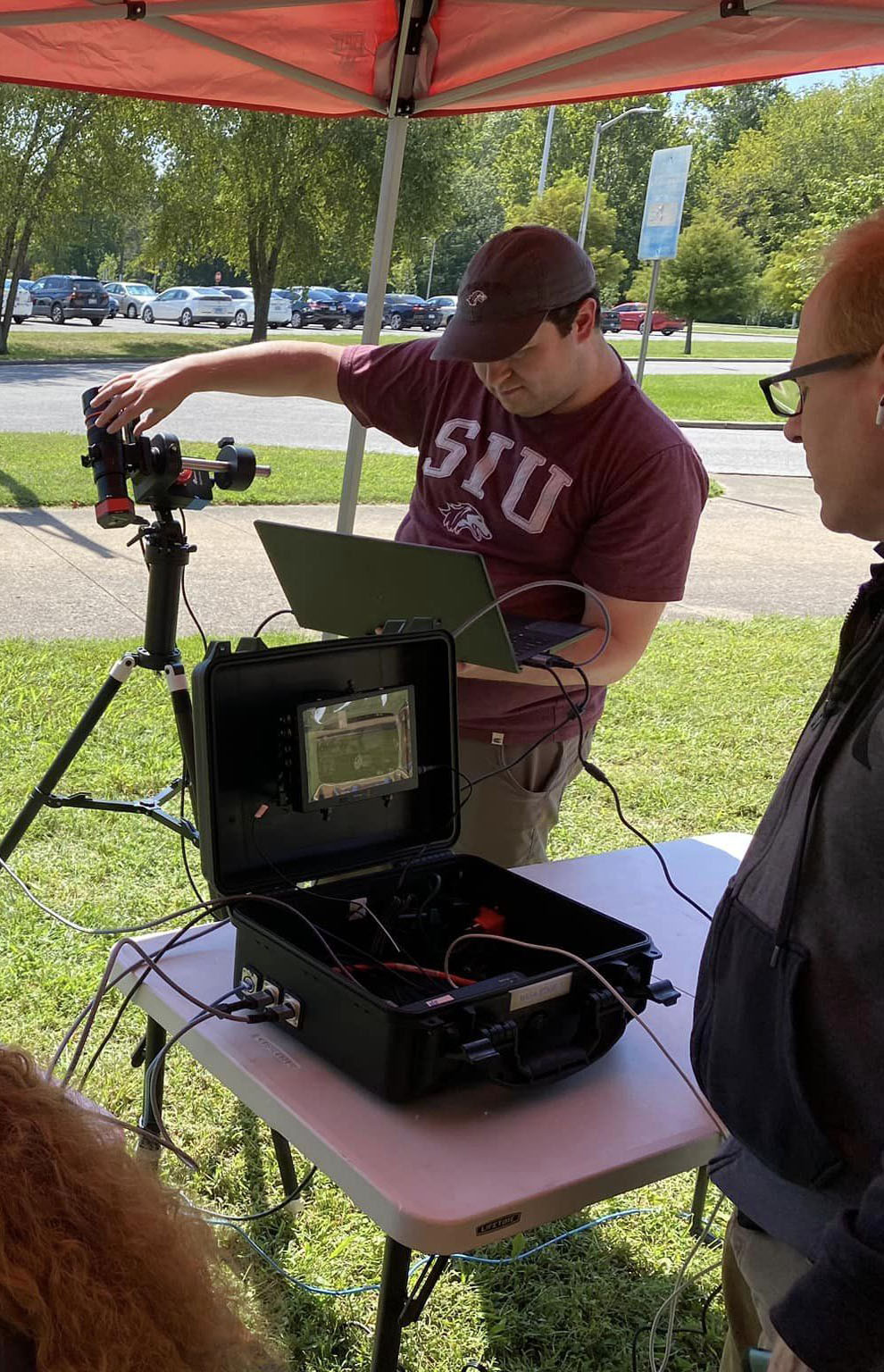Eclipse Research
The upcoming Eclipse presents numerous research opportunities, and we are excited to be working on a few of them here.

SolarSTEAM
Telling the exciting story of the sun through science and discovery, NASA SolarSTEAM invites you to join our community of citizen scientists and experts in heliophysics exploration. Be part of the excitement through our dynamic astronomy events, including the unforgettable April 8, 2024 total solar eclipse, and the much-anticipated solar maximum celebrations in 2024-2025. Join us at SIU Carbondale for in person activities and online from anywhere in the world.
Engage with our scientists and experts at Eclipse Day at Saluki Stadium as we bring you telescope feeds from across North America on April 8, 2024
Explore with NASA, SolarSTEAM, and STEM Education Research Center booth at the Crossroads Astronomy Science and Technology Expo April 7 – 8.
Experience Eclipse 2024 Live from SIU Carbondale on WSIU PBS stations 11am – 2:30pm CT and SolarSTEAM YouTube live April 8, 11am – 3:30pm CT and on popular social media. #SolarSTEAM
Crossroads Eclipse Research Workshop
SIU will host researchers from around the world for eclipse 2024 who wish to present on and conduct observations / data collection during the 2024 total solar eclipse at SIU Carbondale. The SIU Astronomy Observation Area will be open to researchers and astrophotographers to setup photographic and observation equipment in the days prior to eclipse 2024. The Astronomy Observation Area is a gated semi-dark site approximately 2 miles west of the main SIU campus. It has 10 concrete telescope pads as well as parking and room for onsite RV or tent camping for research groups. Additional resources and facilities are available to visiting researchers through the STEM Education Research Center and the School of Physics and Applied Physics. Research groups are encouraged to register for the Crossroads Eclipse Research Workshop (CERW2024) and present your research on campus during the eclipse weekend.
See the CERW2024 website for more information.

The Dynamic Eclipse Broadcast Initiative
The Dynamic Eclipse Broadcast (DEB) Initiative is a nationwide citizen science team led by faculty and staff at SIU Carbondale to broadcast new and exciting views of eclipses. Funded by NASA SMD and the National Science Foundation, the DEB Initiative creates a North American network of volunteer citizen scientist solar observation teams. Teams receive training and become part of the network that will conduct coordinated solar observations leading up to and during the 2023 annular and 2024 total solar eclipse, and web broadcast images from observing sites in near real-time. Compelling images from the partial phases of the eclipses, and science quality data from the path of totality, will be collected from 82 sites from Mexico, Canada and across the USA. Inexpensive camera and telescope systems, combined with new data analysis techniques, enable unique observations of these solar eclipses.
More information at debinitiative.org. Live solar imagery during eclipse 2024 at debra.physics.siu.edu
Solar Telescope Feeds
Live solar imagery from scientific observation teams covering the entire path of totality from Mexico to Canada will be featured on the larger-than-life stadium big screen and monitors throughout campus. Witness first contact along with the first DEB Initiative team in Mexico as the eclipse makes landfall and watch it evolve as the shadow of the Moon crosses the earth at over 1,000 mph. Scientists at Saluki Stadium and from remote observation sites will share their perspective to explain what is being seen and what to look for as totality approaches Carbondale. Through SIU led research projects we have the ability to pull imagery from over 80 DEB Initiative citizen science solar observation sites as well as multi-wavelength specialized solar telescopes operated by SolarSTEAM observation teams. Visitors not only have the opportunity to witness totality for themselves right here in Carbondale, but also see it from different locations and different perspectives in real time along the full path of totality. Through our dedicated feeds you are able to see what is coming and experience the entire range of eclipse phenomenon.
.
Einstein’s Incredible Universe
Researchers in the SIU STEM Education Research Center and the School of Physics and Applied Physics are part of an NSF funded project led by Cosmic Picture, “Einstein’s Incredible Universe,” a major media and outreach program designed to catalyze interest in space science and spark scientific curiosity in learners worldwide. The funding provides for 20 Dynamic Eclipse Broadcast Initiative imaging setups to be provided to girl groups nationwide through an application process administrated by the National Girls Collaborative Project (NGCP). NGCP engages young women nationwide in exploring STEM topics such as space, time, and gravity. SIU is developing training materials, videos, and STEM activities for the project in cooperation with the Science Center of St. Louis. The 20 girl groups will participate in 2024 total solar eclipse observations that investigate thatthe nature of the solar corona. The centerpiece of the project is a film for giant screen and IMAX theaters that will celebrate the groundbreaking work of Albert Einstein, the curiosity that drove him to explore space and time, and the scientific creativity that led to his most revolutionary ideas.
Listening to the Eclipse: How Wildlife Responds to Darkness
The Sounds of Nature project in The PEASE Lab at SIU is partnering with Eclipse Soundscapes, a NASA Citizen Science funded project, to understand how the eclipse affects life on Earth through sound. By deploying sound recorders before, during, and after the eclipse, and with the help of 100 citizen science volunteers, we will collect data on how animals and insects react to the sudden loss of light and expand our understanding of animal sensory. In an event that is usually visually observed, Eclipse Soundscapes is serving as a model for the use of multi-sensory scientific observation and data collection, where observers are asked to observe with all senses available to them. By using this approach, not only do we learn about new approaches to data collection, but we expand the accessibility of science to groups who would otherwise be unable to participate with visual activities alone. Eclipses provide a rare opportunity to advance ecological research by studying how wildlife communication and behavior respond to sudden, dramatic changes in natural stimuli. The PEASE Lab is offering 100+ volunteers a sound sampling kit.
More information and sign-up at peaselab.com/sounds
